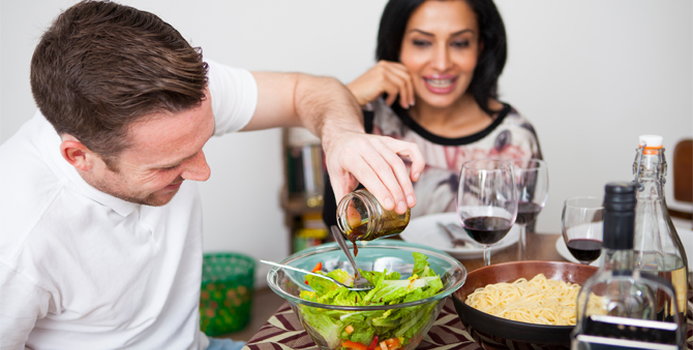Research has long suggested that when dining out, ordering choices reflect the types of foods fellow diners eat (J Acad Nut Diet. 2014 March;114(3):414-429). For example, you may have been planning on ordering a salad, but when your friend orders French fries, you give in and add them, too. This can be true even when you had planned on ordering something healthy -- these decisions are often made spontaneously. Studies also show that people tend to have friends of similar body size. It seems that social norms dominate our food choices and the people with whom we eat may influence our decisions more than previously understood.
A new study now shows that the body weight of fellow diners may influence how much others eat when dining out (Appetite. 2014; 8:263-268). This study raises questions about how a person's physical appearance influences dietary choice. The research took place on a college campus and consisted of 82 undergraduate students who volunteered to participate. A slim, 126-pound actress wore a suit that added 50 pounds to her frame and had dinner with the students in a variety of scenarios, including a pasta and salad meal. The actress ate more pasta and less salad with and without the suit on and conversely, less pasta and more salad with and without the suit. In this study, researchers considered pasta an unhealthy choice and salad a healthy choice.
The students in the study served themselves after watching the actress take her own portion. The study found that students consumed over 30% more pasta when she wore the 50 pound suit no matter if she was eating more pasta or more salad. When she wore the suit and served herself more salad, the students consumed over 40% less salad. Simply put, the students served themselves more unhealthy foods (pasta) and less healthy foods (salad) when eating with a person of larger body size. The amount and types of foods the actress put on her plate may or may not have influenced her fellow diners, but this study indicates that the presence of her prosthetic suit likely influenced their choices.
Experts speculate that the students may have been subconsciously comparing themselves to the body-size of the model. Perceiving a person of larger size than themselves may have caused the students to consume more calories, or splurge on the shared meal. The study indicates that whether we know it or not, people take social cues from others when sharing a meal. It is important not to discriminate or draw attention to the size of your dining partners, but rather to remain mindful of how external factors affect your own behaviors.
Keep in mind that this was a small study and it does not prove a cause-and-effect relationship. More research needs to be done regarding body type of fellow diners and the effects this has on food choice.
Understanding that when dining out, we are heavily influenced both by the body type as well as the food choices of fellow diners, these results show that it is important to focus on your own needs. Subconscious social cues can affect our decisions greatly. Committing to healthy choices before ordering has long been known as a helpful eating habit designed to keep you on track -- make a plan before eating out so you will be less influenced by others choices. Reflect on your own hunger level before ordering and always keep portions in check. Stay true to your needs as an individual.
Ginger Hultin, MS, RD, LDN is a Chicago-based dietitian who specializes in integrative oncology. With a Master's degree from naturopathic Bastyr University, she practices plant-based nutrition and specializes in lab interpretation and appropriate supplementation. Ginger also had a passion for fitness and maintains both group fitness and personal training certifications.



